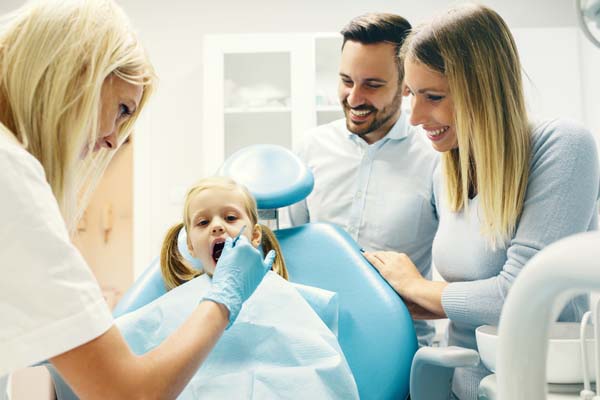4 Things to Ask Your Kid Friendly Dentist

Finding the right kid friendly dentist can be a struggle, but asking the right questions can help parents find one that can put their child at ease. The answers to these questions may also help parents trust that their child is in the right hands for oral health.
Things to ask a kid-friendly dentist
There are many questions that run through a parent’s mind during the first months after a baby is born, but more questions arise when the baby begins teething. Asking the questions below may help parents feel better about a child's dental health.
1. When the first dentist visit should take place
The American Dental Association states that a baby’s first tooth usually appears around six months of age, although it may take up to 14 months for some children. The first appointment with a kid friendly dentist should be scheduled no later than six months after the first tooth pushes through the gums. This is a good time to ask the dentist more questions about how to maintain good oral health as the child grows, such as how to introduce brushing into a daily routine.
2. How to prevent cavities
The National Academies of Sciences, Engineering and Medicine Health and Medicine Division states the appropriate amount of toothpaste for children under three years of age is the size of a grain of rice. Children between the ages of three and six should use a pea-sized amount. A kid friendly dentist can explain how to choose the right kind of fluoride toothpaste to prevent cavities. A parent may also learn how to choose toothpaste with the ADA seal of approval that contains U.S. Food and Drug Administration-approved levels of fluoride.
3. What happens during a visit to a kid friendly dentist
Many parents experience uncertainty and worry about what happens at a dental visit. The dentist can explain what the visit entails, sometimes even over the phone, to provide a parent with an idea of what to expect.
A kid friendly dentist visit typically includes a cleaning, a thorough inspection for cavities and tooth decay and explanations of how to brush properly. The dentist may ask about any habits such as thumb sucking or use of a pacifier and discuss the options for any needed treatments before scheduling the next appointment.
4. What can be done to keep a child calm during visits
Oftentimes, visiting the dentist can be a stressful experience, both for children and parents. Many dentists have a method to help ease the stress and make it a fun visit, such as explaining procedures in simple terms and giving nicknames to tools. A kid friendly dentist understands the fear and uncertainty a child and a parent feel at these visits and tries to put all parties at ease.
Conclusion
Choosing a dentist who understands how to properly treat and take care of a child’s oral health is vital for parents. Asking questions means you, as a parent, can rest easy knowing your child is in good hands. It also helps increase awareness and understanding of how to help children have healthy teeth.
Request an appointment here: https://familychoicedentistry.com or call Family Choice Dental at (505) 634-5657 for an appointment in our Albuquerque office.
Check out what others are saying about our services on Yelp: Read our Yelp reviews.
Related Posts
Oral cancer screening is an essential preventive measure in maintaining overall oral health. The early detection of oral cancer can significantly improve the chances of successful treatment and recovery. As a general dentist, it is vital to inform patients about the importance of regular oral cancer screenings and how these screenings can help identify potential…
Considering a smile makeover and not sure where to start? Read on to learn more. Many people avoid smiling due to dental imperfections. A smile makeover may be the answer. A dentist can improve your smile with cosmetic procedures like teeth whitening, bonding, and veneers. The right professional for the treatment is the key to…
Sometimes, it takes more than one procedure to get the smile of your dreams. A dental provider can create a custom plan called a smile makeover to enhance different aspects of your smile. It is best to ask a provider if a smile makeover is right for you, as they can give personalized professional advice.…
If your teeth are spaced irregularly, you might not have great self-esteem and may consider trying teeth straightening. Plus, the issue might change your oral hygiene habits. One reason is that food might get stuck in them and be difficult to remove. That can weaken the teeth and gums, leading to complications. Keep reading to…
